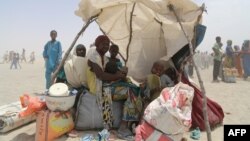Attacks by Islamist insurgents Boko Haram in northeast Nigeria and the islands of Lake Chad have forced tens of thousands across the border to Niger's arid southeastern region of Diffa, worsening a dire humanitarian situation.
An estimated 150,000 people have fled to Diffa in the past two years, according to aid agencies, increasing by one-third the population of the remote region that is largely dependent on aid and suffers from perennial food shortages.
In recent weeks, Boko Haram insurgents have stepped up suicide attacks and raids on villages in Nigeria and surrounding countries in reprisal for an offensive by regional governments against them this year.
The flood of refugees comes as a state of emergency declared by Niger to tackle the insurgency has brought Diffa's economy to a standstill, stiffling revenues from fishing and the trade in peppers, and leaving the population vulnerable.
"We fled all night. I was very scared and I'm still scared. We left everything behind," said Lagari Fogo, a Nigerian refugee at a camp in Gagamari, who said Boko Haram had attacked his village 11 days earlier.
In the makeshift camps, some people drape plastic sheeting over thorny bushes to shelter from the relentless glare of the sun. Their meager belongings, often no more than a few blankets and some pots and pans, are gathered around them.
"We are suffering. We are suffering and it is not over," said Adam Abdoulaye, 35, a father of seven, as he collected a food package from the World Food Program (WFP).
Abdoulaye said commercial activity in the town of Diffa, the regional capital, had been curtailed by the state of emergency and persistent Boko Haram attacks.
"The food situation in Diffa has always been that of chronic shortage," said Michel Hulais, the WFP head in Diffa. "But since the start of recent events that have affected security, this situation has increasingly deteriorated."
Three days to flee
Bamgoye de Dala said he had just three days to pack a few belongings and flee the Lake Chad village of Lelewa with his six children after Niger's government ordered them to leave. He said he had to abandon his animals and all other belongings they could not carry on the 20-kilometer (12-mile) trek.
"Because of Boko Haram, the government asked us to leave. They told us they were at war with them and so we had to abandon the island," the 50-year old father said.
Niger has said that it asked inhabitants to evacuate the islands for their own safety and that it has worked with humanitarian agencies to ensure access to aid.
By the start of this year, Boko Haram's six-year-old campaign to carve an Islamic emirate from northeastern Nigeria had claimed an area the size of Switzerland, killing thousands of people.
A regional offensive by Nigeria, Niger, Chad and Cameroon drove back Boko Haram fighters. In recent weeks, however, the group has killed hundreds of people in attacks, allowing them to retake some towns that were seized, including Damasak, a few kilometers outside Diffa.
Diffa Governor Yacouba Soumana Gao said, however, that Niger's security forces had felt an improvement in cooperation since the election of Nigerian President Muhammadu Buhari in March. He said authorities were easing a restriction on trade in peppers to help the local economy.
"They [Boko Haram] know their days are numbered, and that's why they are in the process of conducting suicide-bombing operations," he said.





